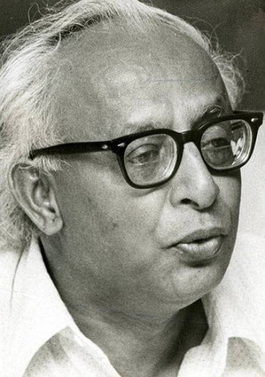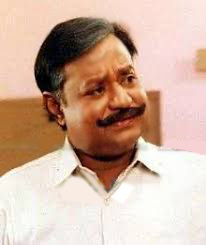External links
- Srinivas Wayangankar at CricketArchive (subscription required)
Srinivas Wayangankar (born 1 August 1946) was an Indian cricketer. He was a right-handed batsman and right-arm off-break bowler who played for Maharashtra. He was born in Bombay.
Wayangankar made a single first-class appearance for the side, during the 1963–64 season, against Baroda. He did not bat in the match, but bowled two overs, taking figures of 1–7, his single wicket being that of Vijay Indulkar.

Uppalapu Srinivas was an Indian mandolin player in Carnatic classical music and composer. U. Srinivas was called the Mozart of classical Indian music and he was a child prodigy.

Mysore Narasimhachar Srinivas was an Indian sociologist and social anthropologist. He is mostly known for his work on caste and caste systems, social stratification, Sanskritisation and Westernisation in southern India and the concept of 'dominant caste'. He is considered to be one of the pioneering personalities in the field of sociology and social anthropology in India as his work in Rampura remains one of the early examples of ethnography in India. That was in contrast to most of his contemporaries of the Bombay School, who focused primarily on a historical methodology to conduct research, mainly in Indology. He also founded the Department of Sociology at the Delhi School of Economics, University of Delhi in 1959.
Srinivasaraghavan Venkataraghavan (, also known as Venkat, is an Indian former international cricketer and umpire. He was a right arm off break bowler and a lower order batter. He captained the Indian cricket team in test cricket and also at the first two ICC Cricket World Cups in 1975 and 1979. He represented Tamil Nadu and South zone in domestic cricket while also playing for Derbyshire in English county cricket from 1973 to 1975.
Sanskritisation is a term in sociology which refers to the process by which castes or tribes placed lower in the caste hierarchy seek upward mobility by emulating the rituals and practices of the dominant castes or upper castes. It is a process similar to "passing" in sociological terms. This term was made popular by Indian sociologist M. N. Srinivas in the 1950s. Sanskritisation has in particular been observed among mid-ranked members of caste-based social hierarchies.

Trivikram Srinivas is an Indian film director and screenwriter who works in Telugu cinema. He is one of the highest-paid directors in South Indian cinema. He has garnered six state Nandi Awards for Best Dialogue Writer and two Filmfare Awards for Best Director. In 2015, he received the BN Reddy National Award for his contributions to Indian cinema.
Madapusi Raghavan Srinivasaprasad, usually known as M. R. Srinivas Prasad is a right-handed batsman and a right-arm off-spin bowler who played cricket for Karnataka Ranji in the Wills Trophy, and the Deodhar Trophy (1984/85). He represented Young India in Zimbabwe (1983/84). His first-class span was from 1979/80 to 1987/88 in which he scored 3031 runs over 53 matches.

Dharmapuri Srinivas was an Indian politician from Telangana. He served as a president of Andhra Pradesh Congress Committee and was a three time Member of the Legislative Assembly.
Kanneboina Srinivasa Rao Yadav, known professionally as Vandemataram Srinivas, is an Indian music director and playback singer who works predominantly in Telugu cinema. He has won two Filmfare Awards and six Nandi Awards. He got the prefix "Vandemataram" from the title song of the film Vande Mataram (1985).

Srinivas Avasarala is an Indian actor, film director, screenwriter, racquetball player, and television presenter known for his works in Telugu cinema. He received two Nandi Awards and a SIIMA Award.

Srinivasan Doraiswamy, known by his stage name Srinivas or Jeans Srinivas, is an Indian playback singer in the Tamil, Malayalam, Telugu, Kannada, and Hindi music industries. Credited to 3000 songs, he is also a music composer, working on projects including films, jingles, albums, television serials, and devotional albums. He received the Kalaimamani award by the Tamil Nadu state government in 2005 and the Tamil Nadu State Film Award twice for the songs "Minsara Poove" (Padayappa) in 1999 and "Maargazhiyil" in 2008. He has also received the Best Male Singer Kerala State Film Award for the song "Bhasuri" in 2007, the Film Critics Award for Best Composer for the movie "Seetha Kalyanam" in 2009, and Best Playback Singer for "Kaisi Hai Yeh Ruth".
Kesiraju Srinivas, popularly known as Ghazal Srinivas, is a Ghazal singer, actor, activist, and frame drum player from Hyderabad, India. He holds the Guinness World Record for most languages sung. He did pioneering work in Telugu Ghazals. He also sings Ghazals in Hindi and Urdu languages. He gave performances in many countries across the world. As part of his peace mission he traveled to war-hit countries like Afghanistan, Pakistan, Iraq, etc. to spread the non-violence movement preached by Mahatma Gandhi. In 2005, he started Ghazal Charitable Trust to promote Ghazals and world peace.

Ninne Premistha is a 2000 Indian Telugu-language romance film, produced by R. B. Choudary on the Super Good Films banner, directed by R. R. Shinde. It stars Nagarjuna, Srikanth, Soundarya, and Rajendra Prasad. The music was composed by S. A. Rajkumar, dialogues were written by Trivikram Srinivas and cinematography was by Shyam K Naidu. It is a remake of the 1999 Tamil film Nee Varuvai Ena. Despite the mixed reviews, the film was a box office hit.

Mysore Srinivas, known by his stage name Thoogudeepa Srinivas was an Indian actor who appeared in Kannada films and is remembered for his portrayal of negative-shaded characters. He is the father of actor, Darshan and film director Dinakar.

Vasudevan Srinivas is an Indian mathematician working in algebraic geometry. He is a Distinguished Professor in the School of Mathematics Tata Institute of Fundamental Research, Mumbai. Srinivas is an elected Fellow of the Third World Academy of Sciences, American Mathematical Society, Indian National Science Academy, and the Indian Academy of Sciences.
Kiran Srinivas is an Indian television and film actor. He received critical acclaim for the role of a drug addict, "Roy D'Souza" in Channel V India's Paanch 5 Wrongs Make A Right and played "Dev" in Colors's 24. He was also seen portraying "Dr. Ishaan Srinivas" in Bindass's show Zindagi Wins. He had also acted in Gumrah on Channel V India, Pyaar Tune Kya Kiya on Zing TV and Yeh Hai Aashiqui on Bindass.
Pandillapalli Srinivas was an Indian Forest Service officer, a Kirti Chakra recipient, who is widely considered to be one of the most outstanding figures in Indian forest conservation, served as Assistant Commander of Special Task Force(STF) to nab gangster Veerappan.

Talasani Srinivas Yadav is an Indian politician who is the former Minister for Animal Husbandry, Fisheries and Cinematography of Telangana since 2019. He is an MLA from Sanathnagar Assembly constituency. Previously he represented from Secunderabad Assembly Constituency.
Wayangankar is an Indian surname. Notable people with the surname include:
Krishna Srinivas (1913–2007) was an Indian writer of English literature, known for his spiritualistic poems. He was the president of the World Poetry Society Intercontinental (WPSI). The Government of India awarded him the Padma Bhushan, the third highest civilian award, in 2004.

Vaathi (transl. Teacher) is a 2023 Indian bilingual period action drama film written and directed by Venky Atluri. The film was simultaneously shot in Tamil and Telugu with the latter version titled as Sir. The film star Dhanush in main lead as a School Teacher.